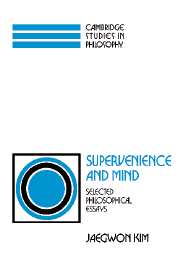Book contents
- Frontmatter
- Contents
- Preface
- Sources
- Part I Events and supervenience
- Part II Mind and mental causation
- 10 Psychophysical supervenience
- 11 Psychophysical laws
- 12 What is “naturalized epistemology”?
- 13 Mechanism, purpose, and explanatory exclusion
- 14 The myth of nonreductive materialism
- 15 Dretske on how reasons explain behavior
- 16 Multiple realization and the metaphysics of reduction
- 17 The nonreductivist's troubles with mental causation
- 18 Postscripts on mental causation
- Index
14 - The myth of nonreductive materialism
Published online by Cambridge University Press: 28 January 2010
- Frontmatter
- Contents
- Preface
- Sources
- Part I Events and supervenience
- Part II Mind and mental causation
- 10 Psychophysical supervenience
- 11 Psychophysical laws
- 12 What is “naturalized epistemology”?
- 13 Mechanism, purpose, and explanatory exclusion
- 14 The myth of nonreductive materialism
- 15 Dretske on how reasons explain behavior
- 16 Multiple realization and the metaphysics of reduction
- 17 The nonreductivist's troubles with mental causation
- 18 Postscripts on mental causation
- Index
Summary
Reductionism of all sorts has been out of favor for many years. Few among us would now seriously entertain the possibility that ethical expressions are definable, or reducible in some broader sense, in terms of “descriptive” or “naturalistic” expressions. I am not sure how many of us can remember, in vivid enough detail, the question that was once vigorously debated as to whether so-called “physical-object statements” are translatable into statements about the phenomenal aspects of perceptual experience, whether these are conceived as “sense data” or as some manner of “being appeared to”. You may recall the idea that concepts of scientific theories must be reduced, via “operational definitions”, to intersubjectively performable procedures whose results can be ascertained through observation. This sounded good - properly tough-minded and hard-nosed - but it didn' t take long for philosophers and scientists to realize that a restrictive constraint of this sort was neither enforceable nor necessary - not necessary to safeguard science from the threat of metaphysics and pseudo-science. These reductionisms are now nothing but museum pieces.
In philosophy of mind, too, we have gone through many reductionisms; some of these, such as logical behaviorism, have been defunct for many years; others, most notably, the psychoneural identity theory, have been repeatedly declared dead; and still others, such as versions of functionalism, are still hanging on, though with varying degrees of difficulty. Perhaps as a result of the singular lack of success with which our earlier reductionist efforts have been rewarded, a negative image seems to have emerged for reductionisms in general.
- Type
- Chapter
- Information
- Supervenience and MindSelected Philosophical Essays, pp. 265 - 284Publisher: Cambridge University PressPrint publication year: 1993
- 14
- Cited by

